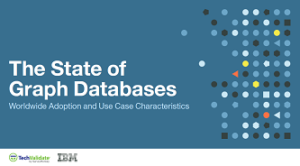

If your organization is like many, you may be taking a “store everything” approach to data. After all, storage has become more affordable than ever in recent years, and due to the accessibility of cloud-based technology, capacity has become almost limitless. The clear challenge is tapping into those massive volumes of data to derive actionable business value. That requires analytics. However, using a traditional relational database may not be the best approach, because adapting relational databases to answer deeply complex questions can create performance bottlenecks and added maintenance burden for your business.
To gain a real-world perspective on how IT professionals are addressing these challenges, IBM, in partnership with TechValidate, conducted a global survey of 1,365 entrepreneurs and developers about the potential they see for graph databases as well as their current and planned use for this technology. We also queried them about how they are using graph to address problems, the benefits they are realizing, and examined how adoption of this technology differs by company size and industry. Survey respondents spanned small, medium and large companies in diverse industries across 74 countries.
Specifically, large enterprises comprised 38 percent of the responses, with small businesses representing 36 percent, and mid-sized businesses representing 19 percent. The survey population included a wide array of professional roles, including developers, architects, IT managers and business leaders, with the largest percentages being attributed to developers/programmers (44 percent), application/software architects (13 percent) and IT directors and managers (11 percent). Respondents represented a range of industries, with the majority in technical industries: computer services (42 percent) and computer software (22 percent).
This paper provides an overview of graph technology, details the results of the survey—and highlights findings that debunk some of the most popularly held views about graph technology.
All information that you supply is protected by our privacy policy. By submitting your information you agree to our Terms of Use.
* All fields required.



